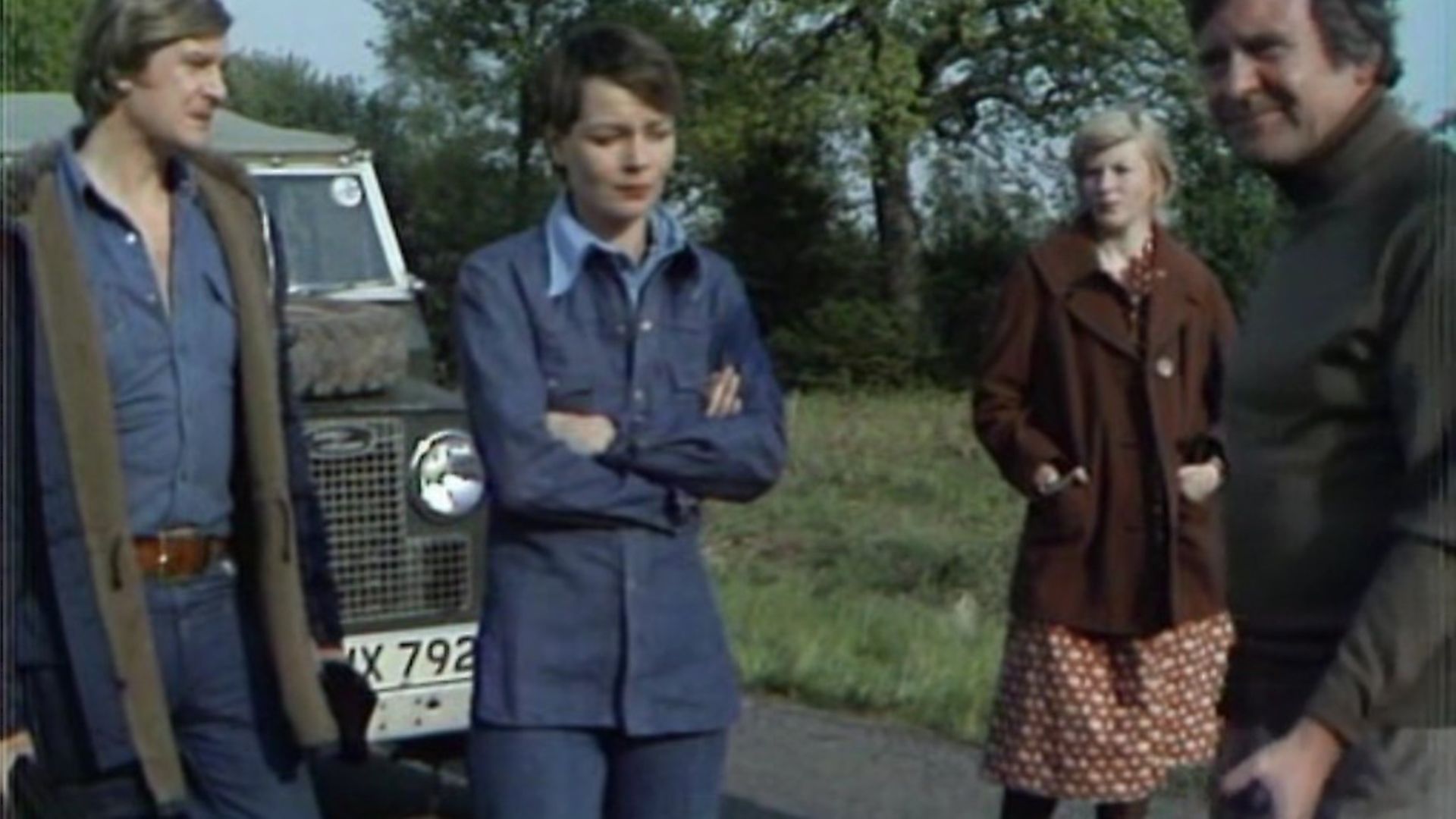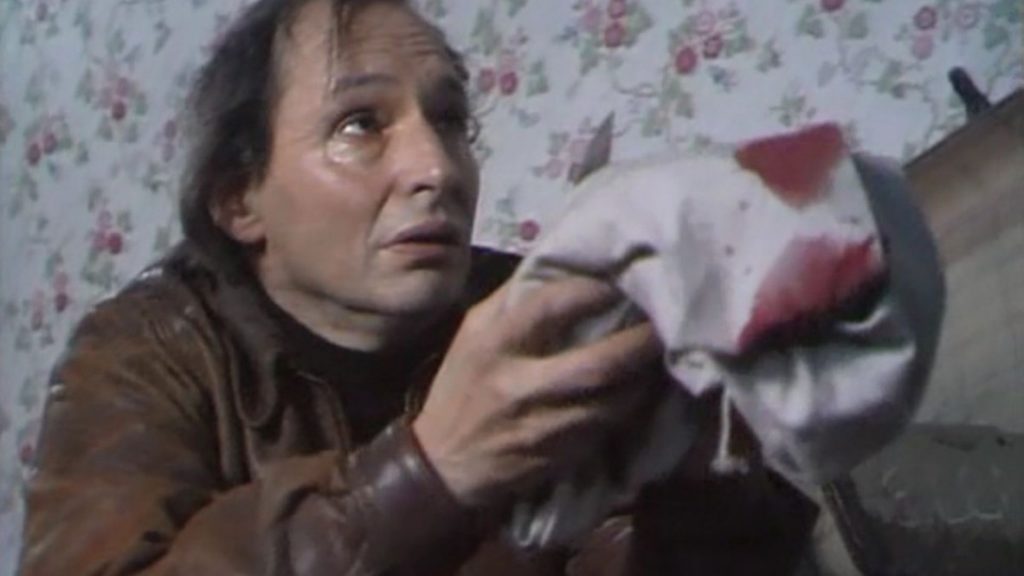
SOPHIA DEBOICK on a forgotten TV classic from the 1970s, which treated its viewers like grown-ups.

On the Wednesday night of April 16, 1975 at 8.10pm, immediately after the BBC 1 family film – a 1950s western starring Wildfire the Wonder Horse – Britain was hit with a vision of bleak horror from the mind of creator of the Daleks, Terry Nation.
The opening credits of Survivors told the back story with elegant economy. A masked doctor lifts a lab flask with gloved hands, but as the music rises it slips from his grasp and crashes to the floor. He walks through a busy airport, but soon after landing, he collapses. Passport stamps from destinations all around the world fill the screen, ending with London. The screen seeps blood-red. A deadly global pandemic has begun in one of the most uncompromising drama series of the decade.
The television of the 1970s and 1980s offered countless terrible visions that indelibly etched themselves on the psyche, of which 1984’s nuclear nightmare Threads was the non plus ultra, positively nauseating in its visceral portrayal of a worst-case apocalyptic scenario.
Survivors, following a community of individuals with the fortitude and ingenuity to forge a new world out of the ashes of the old one, was certainly perkier than that, buoyed by a strong sense of the Wyndhamian ‘cosy catastrophe’ – the community lives in a gorgeous stately pile, and comfy knitwear, home brew, and bucolic scenes of small-scale farming feature heavily. But the visuals were deceiving. As the Scarred for Life book (based on the @ScarredforLife2 Twitter account which celebrates ‘growing up in the dark side of the 1970s and 1980s with the scariest, most inappropriate pop culture ever’) says: ‘If you’ve never seen Survivors, picture it as The Good Life, but with Surbiton in flaming ruins and the decomposing corpses of Jerry and Margot permanently visible in the next door garden.’ Indeed, the initial horror of the epidemic that only one in 5,000 people survive is nothing compared to the fates that befall the characters over the three series.
Starvation, rats, fire, explosion and poisoning are just some of the ways our survivors die horribly. Other people are the greatest threat and there are murders galore. A vicar is brutally blasted in the chest with a shotgun. A kindly barge-dweller ends up floating face down in a river with a kitchen knife stuck between his shoulder blades. Having survived one virus, there is no defence from other diseases. A gentle hippy is killed by lethal injection after contracting bubonic plague. An aging intellectual is shot dead after rabies turns him into a rampaging lunatic. ‘Bleak’ seems an insufficient word for this pre-watershed horror show of cult leaders, marauding predators, crazed snipers, wannabe fascist dictators and feral children. Family viewing this was not.
Even the heroes of Survivors were disorientatingly complicated, failing hard as they faced the near impossible moral choices of their circumstances. Abby Grant (Carolyn Seymour, now a cult figure for her appearances in Star Trek: The Next Generation and her videogame voice work) is as strong a female character as 1970s British television produced. Strikingly lithe and razor-cheekboned, this moneyed home counties wife bucks expectations to become the steely head of the community, posing a challenge to audiences more used to the buxom beauties of The Benny Hill Show and the female grotesques of Are You Being Served? and Rising Damp.
We first encounter Denis Lill’s Charles Vaughan, a bearded, intense Welshman, as in possession of a kind of breeding hareem – he is convinced that maximising the birth rate is humankind’s only hope for survival. By series two he is, far less creepily, living monogamously with the mumsy Pet, and the couple become the strong, warm heart of both the community and the series. The perpetually unsmiling and louchely tight-jeaned Greg Preston, played by Ian McCulloch (previously a regular in such series as Dr. Finlay’s Casebook and Colditz, and later to make the Italian-made zombie film his speciality) is the hero of the piece.
Yet, even he is not infallible as, with Abby’s approval, he executes the learning-disabled Barney, believing him guilty of a sexually-motivated murder (the real killer is lecherous Welsh hobo Tom Price, whose skin-crawling effect is a whole world of trauma in itself). Everyone here struggles terribly with their new circumstances. No-one is pure in thought and deed.
But Survivors did more than just discomfit the viewer, and it avoided many of the clichés of post-apocalyptic fiction to instead use that setting to dissect almost every topical subject going: abortion, euthanasia, sexual violence, capital punishment, class, religion, disability, environmentalism. The series two episode Over the Hills was a prime example, dealing with reproductive rights, as the apparently still baby-obsessed Charles throws a party to celebrate young Sally’s pregnancy (not that, on this occasion, he had anything to do with it). After Charles lambasts former student doctor Ruth for advising the younger women about DIY contraceptive methods, she pushes back with a strongly feminist argument, while the headstrong Melanie makes clear her intention not to abandon hard-won rights to bodily autonomy just because most of humanity has been wiped out. Sally ultimately deliberately induces a miscarriage, and the episode is a complex exploration of power, self-determination and the conflict of rights and responsibilities.
The series certainly had some serious flaws. The acting was often ropey, the narrative and characterisation became disjointed as Terry Nation and series producer Terence Dudley pulled in opposite directions, and the script sometimes fell into sledgehammer exposition. The whole thing was also painfully middle class – there were plenty of RADA-derived accents, Charles and Greg couldn’t have been anything other than an architect and an engineer, and fashionable country kitchens and Laura Ashley dresses abounded. Additionally, the cast was achingly white, and race was a glaring omission from the list of issues the series tackled.
Ian McCulloch, who wrote some of the episodes in series two and three as well as having a starring role, had plans for series four that would have rather over-corrected that omission, depicting Britain being colonised by a technologically superior black African state led by an Idi Amin-type figure.
Unsurprisingly, in the context of race riots on the streets of London in 1977 just as series three ended, the BBC baulked at the idea, and McCulloch’s Greg instead rather fizzled out, largely absent from the last series after rather improbably going off in a hot air balloon to help the starving Norwegians, and finally (spoiler alert!) dying of smallpox.
When the series was revived in 2008 (just in time for the global financial collapse and swine flu), the producers’ hyper-sensitivity to the original’s alleged racism meant that the carefully calibrated ethnic mix of the cast, including the creation of two Asian characters, became a distracting focus in itself when it should have just been a natural part of transposing the series to modern Britain. The remake may have had far slicker production values, but it lost much of the grit of the original and swapped its moral ambiguities for pushing a clear message of ecological responsibility. A slight amateurishness, it turned out, allows viewers some latitude and space to think.
When civilisation does collapse, having availed yourself of the Survivors DVD box set (2entertain) in advance may have given you some useful pointers on how to build a slurry-powered generator, although it would also have made the misleading suggestion that nice jumpers and blackberry wine are the most essential components for getting through the apocalypse. But for all its mild absurdity, Survivors was thoroughly grown-up telly that used a possible future reality to meaningfully explore the problems of now.









